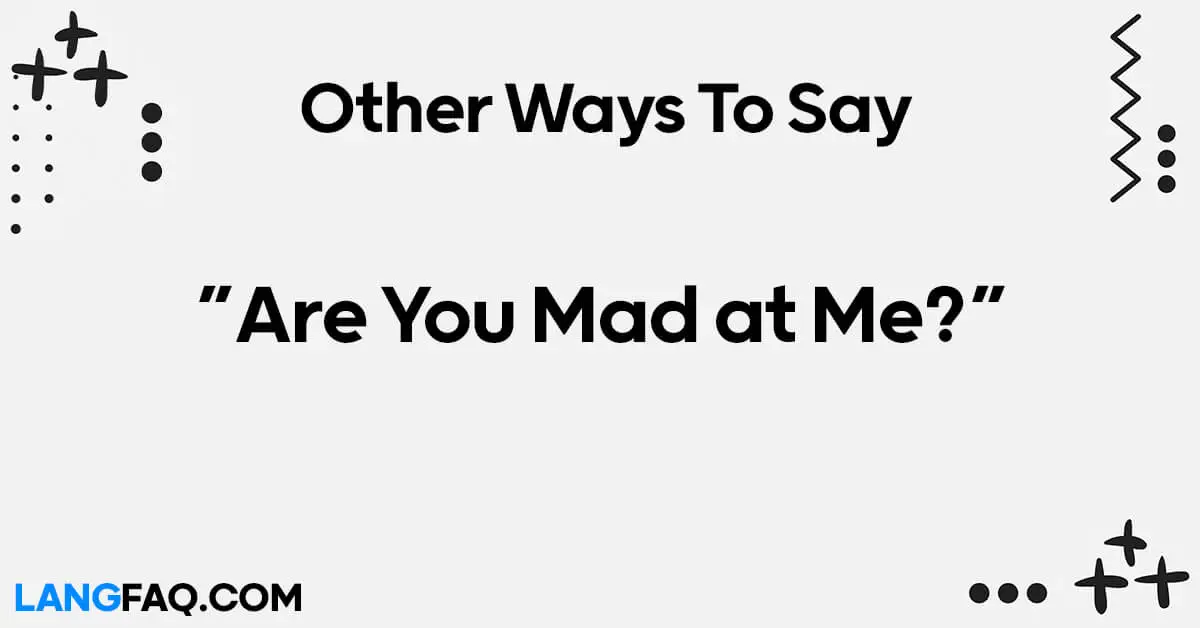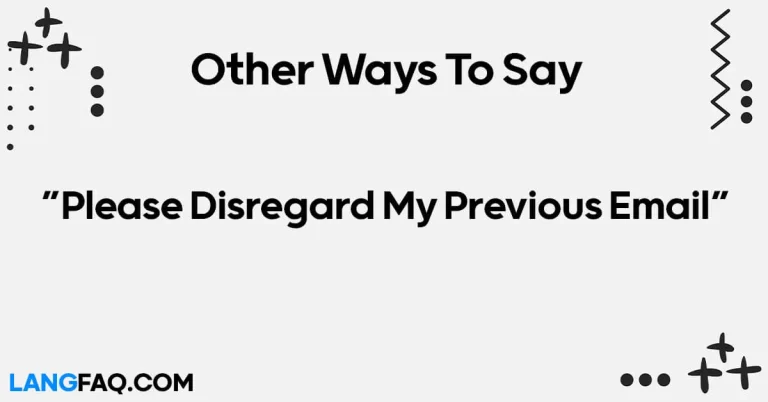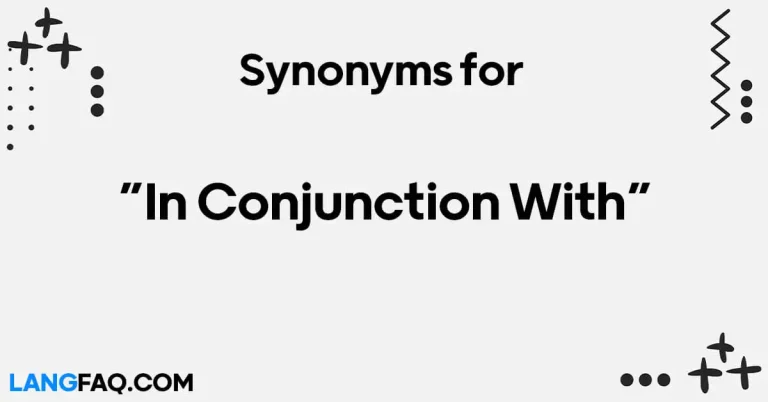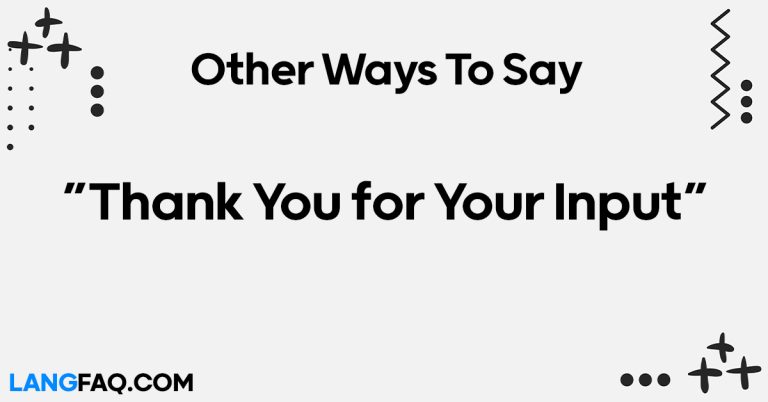Welcome to Various Expressions.
In the intricate dance of human interactions, understanding the nuances of asking, “Are You Mad at Me?” can significantly impact relationships. This guide explores 12 diverse approaches, offering insights into effective communication and emotional intelligence.
12 Other Ways to Ask “Are You Mad at Me?”
Here are 12 alternative ways to ask, “Are You Mad at Me?” in English:
- Is everything okay between us?
- Have I done something to upset you?
- Did I unintentionally hurt your feelings?
- Are we on good terms?
- Is there any tension between us?
- Have I misunderstood something?
- Did I miss the mark in our recent interaction?
- Are you upset with me?
- Have I crossed any boundaries?
- Is there any issue lingering between us?
- Did my actions bother you?
- Are you harboring any resentment towards me?
Here’s a table with meanings and examples for the alternative ways to ask, “Are You Mad at Me?”
| Question | Meaning | Example |
|---|---|---|
| Is everything okay between us? | Seeking assurance about the relationship. | “I’ve noticed a change; is everything okay between us?” |
| Have I done something to upset you? | Inquiring if a specific action caused upset. | “I sense tension; have I done something to upset you?” |
| Did I unintentionally hurt your feelings? | Checking for unintentional harm. | “I hope I didn’t hurt your feelings unknowingly.” |
| Are we on good terms? | Confirming the overall relationship status. | “I want to make sure we’re on good terms. Are we?” |
| Is there any tension between us? | Addressing the presence of underlying tension. | “I sense tension; is there something between us?” |
| Have I misunderstood something? | Clarifying potential misunderstandings. | “I want to make sure I understand; have I misunderstood something?” |
| Did I miss the mark in our recent interaction? | Seeking feedback on recent actions. | “I feel like I may have missed the mark; did I in our recent interaction?” |
| Are you upset with me? | Directly addressing the possibility of upset. | “I get the sense you might be upset with me; is that true?” |
| Have I crossed any boundaries? | Inquiring about potential boundary violations. | “I want to ensure I respect your boundaries; have I crossed any?” |
| Is there any issue lingering between us? | Checking for unresolved issues. | “I feel like something might be unresolved; is there an issue between us?” |
| Did my actions bother you? | Seeking confirmation of any bothersome actions. | “I’m worried my actions may have bothered you; did they?” |
| Are you harboring any resentment towards me? | Addressing the possibility of resentment. | “I hope there’s no lingering resentment towards me; is there?” |
These alternative ways to ask if someone is mad provide a nuanced and considerate approach to understanding the emotional dynamics in a relationship. By using varied expressions, individuals can choose the question that best fits the situation, promoting effective communication and fostering a healthier connection.
Is It Correct to Say “Are You Mad at Me?”?
Absolutely, the phrase “Are you mad at me?” is a grammatically correct and commonly used expression in English. It is a straightforward and clear way to inquire whether someone is upset or angry with you. Here’s a breakdown of its correctness and usage:
Grammar and Structure:
- Subject-Verb Agreement: The sentence follows proper subject-verb agreement, with “you” as the subject and “are” as the corresponding verb.
Proper Usage:
- Common in Conversations: This phrase is widely used in both formal and informal settings. It’s a natural way to address potential issues or tensions in relationships.
- Clarity and Directness: The sentence is clear and direct, leaving little room for misinterpretation. It efficiently conveys the speaker’s concern about the other person’s emotions.
Informal and Formal Contexts:
- Informal Conversations: This phrase is commonly used among friends, family, or in casual settings to check in on someone’s feelings.
- Formal Inquiries: It can also be utilized in more formal contexts when addressing potential conflicts or misunderstandings in professional relationships.
Example Sentence:
“Hey, I noticed things have been a bit off lately. Are you mad at me?”
Email Sample:
Subject: Seeking Clarification
Hi [Recipient’s Name],
I hope this email finds you well. I’ve sensed a bit of tension, and I wanted to reach out to clarify. Are you mad at me? Your thoughts and feelings matter, and I’m open to discussing anything that might be bothering you.
Best regards,
[Your Name]
Variation for Different Relationships:
- Among Colleagues: “Is there any issue between us at work?”
- With Friends: “Have I done something to upset you, buddy?”
- In a Mentor-Mentee Context: “Did I miss the mark on our recent project, or are you upset with me?”
Professional Mail Example With “Are You Mad at Me?”
Subject: Seeking Clarification and Open Communication
Dear [Recipient’s Name],
I trust this email finds you well. I am writing to address a matter that has caught my attention recently, and I believe it’s crucial for us to openly discuss it.
In our recent interactions, I have sensed a subtle change in dynamics, and I want to ensure that we are on the same page. Professional collaboration is paramount to our success, and maintaining clear communication is a key component of that.
I would like to ask, without any presumption, if there is any issue or concern you might have regarding our recent projects or interactions. The last thing I would want is for any potential miscommunication or oversight to hinder our professional relationship.
Your perspective is highly valued, and I want to assure you that my intention is solely to foster an environment where we can work seamlessly and address any challenges together. If there’s anything on your end that requires attention or clarification, I am here and open to discussing it.
Please let me know a convenient time for you, and we can arrange a meeting to delve into any concerns or queries you may have. Your openness and honesty are greatly appreciated, and I believe addressing any potential issues proactively will contribute to a more positive and productive working relationship.
Looking forward to your response and the opportunity to enhance our communication for continued success.
Best regards,
[Your Full Name] [Your Position] [Your Company] [Your Contact Information]
Is Everything Okay Between Us?
In the intricate dance of human relationships, there comes a moment when you sense a shift, a subtle change that raises questions about the state of your connection. In these instances, the question “Is everything okay between us?” serves as a delicate yet direct inquiry into the status of your relationship.
When to Use:
- Formal Context: In professional settings, this question can be crucial when working closely with colleagues or superiors. It demonstrates your commitment to maintaining a positive working relationship.
- Informal Context: When friendships seem strained or when you detect a change in the dynamics, this question can open the door to candid conversations.
Example Sentence:
“John, I’ve noticed a shift in our interactions lately. Is everything okay between us?”
Email Sample:
Subject: Checking In – Our Recent Interactions
Hi [Recipient’s Name],
I hope this message finds you well. I’ve sensed a slight change in our recent interactions, and I wanted to check in and make sure everything is okay between us. Your thoughts and feelings are important to me, and I value our relationship. Let’s connect soon to discuss this further.
Best regards,
[Your Name]
Have I Done Something to Upset You?
Effective communication often involves addressing specific concerns rather than dancing around the issue. The question “Have I done something to upset you?” is a direct yet empathetic approach to understanding if a particular action has caused distress.
When to Use:
- Formal Context: In professional environments, especially when working in teams, this question shows accountability and a willingness to rectify any unintentional harm.
- Informal Context: Within personal relationships, asking this question can diffuse tension and pave the way for open dialogue.
Example Sentence:
“Sarah, I sense there might be some tension, and I want to address it. Have I done something to upset you?”
Email Sample:
Subject: Seeking Clarity
Hi [Recipient’s Name],
I hope this message finds you well. I’ve noticed a shift in our interactions, and I want to address it directly. Have I done something to upset you? Your feelings matter to me, and I’m here to understand and make amends if needed.
Best regards,
[Your Name]
Did I Unintentionally Hurt Your Feelings?
Understanding the impact of your actions is crucial for maintaining healthy relationships. The question “Did I unintentionally hurt your feelings?” demonstrates a commitment to self-awareness and empathy.
When to Use:
- Formal Context: In professional settings, especially when collaborating on projects, this question shows emotional intelligence and a dedication to maintaining a positive team dynamic.
- Informal Context: In personal relationships, such as friendships or family bonds, this question fosters open communication and mutual understanding.
Example Sentence:
“Mike, I want to make sure I haven’t unknowingly hurt your feelings. Did something I said or did bother you?”
Email Sample:
Subject: Clarification and Openness
Hi [Recipient’s Name],
I’ve been reflecting on our recent interactions, and I want to ensure that I haven’t unintentionally hurt your feelings. Your comfort and well-being are important to me. Let’s chat about it when you have the time.
Warm regards,
[Your Name]
Are We on Good Terms?
In both personal and professional relationships, maintaining clarity about the state of your connection is vital. The question “Are we on good terms?” seeks to ensure transparency and open communication.
When to Use:
- Formal Context: In a professional setting, especially after a challenging project or collaboration, this question can help assess the current standing and foster a positive working environment.
- Informal Context: In personal relationships, such as friendships or familial bonds, this question can be used to address any unspoken concerns and strengthen the connection.
Example Sentence:
“Emily, I value our working relationship. Can we check in and make sure we are on good terms?”
Email Sample:
Subject: Maintaining Positive Connections
Hi [Recipient’s Name],
I hope this message finds you well. I’ve been reflecting on our recent interactions, and I want to ensure that we are on good terms. Your insights and thoughts are important to me, and I’m committed to maintaining a positive connection. Let’s schedule some time to discuss this further.
Best regards,
[Your Name]
Is There Any Tension Between Us?
Detecting tension within a relationship is an intuitive skill, and addressing it directly can lead to resolution. The question “Is there any tension between us?” invites open communication about underlying issues.
When to Use:
- Formal Context: In professional settings, particularly when working closely with team members or superiors, this question shows a proactive approach to conflict resolution.
- Informal Context: In personal relationships, especially with friends or family, this question fosters an environment where concerns can be addressed openly.
Example Sentence:
“James, I’ve sensed a bit of tension lately. Can we talk about it and see if there’s anything between us that needs addressing?”
Email Sample:
Subject: Addressing Any Unspoken Concerns
Hi [Recipient’s Name],
I hope this message reaches you in good spirits. Recently, I’ve noticed a slight change in our interactions, and I’m wondering if there might be any tension between us. Your perspective is important to me, and I’d love to hear your thoughts when you have a moment.
Warm regards,
[Your Name]
Have I Misunderstood Something?
Clarity in communication is essential, and sometimes, misinterpretations can lead to misunderstandings. The question “Have I misunderstood something?” encourages open dialogue and helps rectify any miscommunication.
When to Use:
- Formal Context: In professional environments, particularly during discussions or collaborations, this question demonstrates a commitment to clear communication and mutual understanding.
- Informal Context: In personal relationships, especially when navigating complex emotions, this question shows a willingness to address any misinterpretations.
Example Sentence:
“Anna, I want to ensure we’re on the same page. Have I misunderstood something in our recent conversations?”
Email Sample:
Subject: Seeking Clarity for Better Understanding
Hi [Recipient’s Name],
I hope you’re doing well. I’ve been reflecting on our recent discussions, and I want to make sure I haven’t misunderstood anything. Your perspective is valuable to me, and I’d appreciate the opportunity to discuss this further.
Best regards,
[Your Name]
Did I Miss the Mark in Our Recent Interaction?
Acknowledging and rectifying any potential missteps in your actions is crucial for maintaining positive relationships. The question “Did I miss the mark in our recent interaction?” shows humility and a commitment to self-improvement.
When to Use:
- Formal Context: In professional settings, especially after a crucial meeting or collaboration, this question demonstrates a proactive approach to addressing any shortcomings.
- Informal Context: In personal relationships, such as friendships or family bonds, this question fosters open communication and a culture of continuous improvement.
Example Sentence:
“David, I’ve been reflecting on our recent interaction. Did I miss the mark in any way? Your feedback is valuable to me.”
Email Sample:
Subject: Reflections on Our Recent Interaction
Hi [Recipient’s Name],
I hope this email finds you well. I’ve been thinking about our recent interaction, and I want to ensure I didn’t miss the mark in any aspect. Your insights are crucial to me, and I’d appreciate any feedback you might have.
Warm regards,
[Your Name]
Are You Upset with Me?
Addressing the possibility of someone being upset directly is an honest and transparent approach to communication. The question “Are you upset with me?” invites open dialogue about emotions and concerns.
When to Use:
- Formal Context: In professional environments, particularly when working closely with colleagues, superiors, or clients, this question demonstrates emotional intelligence and a commitment to maintaining positive relationships.
- Informal Context: In personal relationships, such as friendships or familial bonds, this question fosters an environment where feelings can be openly discussed.
Example Sentence:
“Alex, I sense there might be some tension. Are you upset with me? Let’s talk about it and address any concerns.”
Email Sample:
Subject: Addressing Potential Concerns
Hi [Recipient’s Name],
I hope this message finds you well. Recently, I’ve felt a shift in our interactions, and I want to address it directly. Are you upset with me? Your feelings matter, and I’d like to have an open conversation to understand better.
Best regards,
[Your Name]
Have I Crossed Any Boundaries?
Respecting personal boundaries is fundamental to maintaining healthy relationships. The question “Have I crossed any boundaries?” shows a high level of self-awareness and a commitment to mutual respect.
When to Use:
- Formal Context: In professional settings, particularly when working closely with team members, addressing this question demonstrates professionalism and a commitment to maintaining a healthy working environment.
- Informal Context: In personal relationships, especially when navigating sensitive topics, this question fosters open communication and trust.
Example Sentence:
“Emma, I want to make sure I respect your boundaries. Have I crossed any lines or made you uncomfortable in any way?”
Email Sample:
Subject: Respecting Your Comfort Zone
Hi [Recipient’s Name],
I hope you’re doing well. I’ve been reflecting on our recent interactions, and I want to ensure I haven’t crossed any boundaries. Your comfort is paramount to me, and I’d appreciate any feedback you might have.
Warm regards,
[Your Name]
Is There Any Issue Lingering Between Us?
Addressing the possibility of unresolved issues directly is crucial for maintaining a healthy connection. The question “Is there any issue lingering between us?” encourages open communication and resolution.
When to Use:
- Formal Context: In professional settings, especially after a challenging project or collaboration, this question shows a commitment to addressing and resolving any lingering issues for a positive working relationship.
- Informal Context: In personal relationships, such as friendships or familial bonds, this question fosters an environment where concerns can be addressed openly.
Example Sentence:
“Sophie, I’ve sensed that something might be unresolved between us. Is there any issue lingering that we should address?”
Email Sample:
Subject: Seeking Resolution for a Stronger Connection
Hi [Recipient’s Name],
I hope this message finds you in good spirits. I’ve been reflecting on our recent interactions and wonder if there might be any lingering issues between us. Your perspective is essential to me, and I’d love to discuss this further.
Best regards,
[Your Name]
Did My Actions Bother You?
Acknowledging the impact of your actions on others is a sign of emotional intelligence. The question “Did my actions bother you?” shows humility and a willingness to take responsibility for your behavior.
When to Use:
- Formal Context: In professional settings, particularly when working closely with colleagues or superiors, addressing this question demonstrates professionalism and a commitment to maintaining a positive working environment.
- Informal Context: In personal relationships, such as friendships or family bonds, this question fosters open communication and trust.
Example Sentence:
“Lisa, I want to make sure my actions haven’t bothered you. Did something I did cause any discomfort or concern?”
Email Sample:
Subject: Reflecting on Our Interactions
Hi [Recipient’s Name],
I hope you’re well. I’ve been reflecting on our recent interactions, and I want to ensure my actions haven’t bothered you. Your feelings are important to me, and I’d appreciate any insights you can share.
Warm regards,
[Your Name]
Are You Harboring Any Resentment Towards Me?
Addressing the possibility of resentment directly is crucial for maintaining a healthy connection. The question “Are you harboring any resentment towards me?” encourages open communication and resolution.
When to Use:
- Formal Context: In professional settings, especially after challenging projects or collaborations, addressing this question demonstrates professionalism and a commitment to maintaining a positive working relationship.
- Informal Context: In personal relationships, such as friendships or familial bonds, this question fosters an environment where concerns can be addressed openly.
Example Sentence:
“Tom, I want to ensure our relationship is healthy. Are you harboring any resentment towards me that we should discuss?”
Email Sample:
Subject: Nurturing a Positive Relationship
Hi [Recipient’s Name],
I hope this email finds you in good spirits. Recently, I’ve been reflecting on our interactions, and I want to ensure there’s no lingering resentment. Your insights are important to me, and I’d appreciate the opportunity to discuss this further.
Best regards,
[Your Name]
FAQs
Q: How do I know if someone is genuinely mad at me?
Understanding body language and subtle cues is crucial. Look for signs like avoiding eye contact, crossed arms, or curt responses.
Q: Is humor always a good way to lighten the mood?
While humor can be effective, it’s essential to gauge the situation. In sensitive matters, ensure your humor is appropriate and won’t be misconstrued.
Q: Should I apologize even if I’m not sure why the person is mad?
A sincere apology for any unintentional wrongdoing shows empathy. It opens the door for the other person to express their feelings.
Q: What if the person needs time and space but doesn’t communicate that?
Respect their non-verbal cues. Give them the necessary space, but express your openness to talk when they feel ready.
Q: How can I rebuild trust after a conflict?
Consistent communication, transparency, and aligning actions with words are key to rebuilding trust. It takes time, patience, and demonstrated change.
Q: Are there communication pitfalls I should be aware of?
Avoid assumptions, defensiveness, and blame. Stay open-minded and actively listen to foster a healthy exchange of perspectives.
Conclusion
Strengthening Connections.
Navigating the delicate question, “Are You Mad at Me?” requires finesse. By incorporating these diverse approaches, you not only enhance your communication skills but also deepen the connections that matter most.







